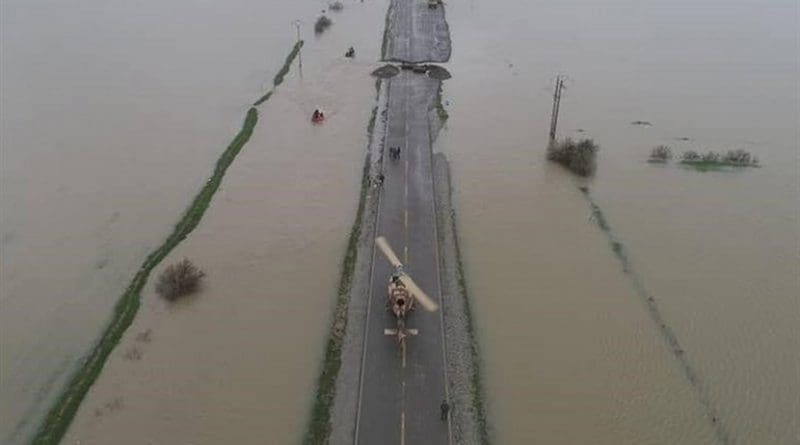Flooding Crisis Highlights Iranian Regime’s Incompetence – OpEd
By Arab News
By Dr. Majid Rafizadeh*
One important indicator that can show whether a political establishment is competent and efficient in governing a country is to examine the way it responds to, manages and controls domestic emergencies and crises.
Iran has been hit with flash floods in the last few weeks. At least 26 of the country’s 31 provinces, including about 1,900 cities and villages, have been struck by major flooding. The first flood hit the northeastern part of Iran on March 19, the second disaster occurred in the western and southwestern parts of the country on March 25, and the flash floods have continued to swamp various parts of the west and southwest.
In the last two weeks, the death toll has reached 62, according to the head of the Iranian Legal Medicine Organization, who believes the number of fatalities will continue to rise.
Roughly a third of Iran’s roads have been disrupted by the floods. Behnam Saeedi, a spokesman for the National Disaster Management Organization, who spoke on Iranian state TV, said: “Seventy-eight intercity roads have been blocked, as many as 2,199 rural roads and 84 bridges have been washed away.” He added that: “Across 15 provinces, 141 rivers burst their banks and around 400 landslides were reported.”
The Iranian government’s response has been totally inadequate, with the mishandling of the crisis and lack of preparedness evident. Many of the flood-stricken areas have witnessed no relief. The Red Crescent’s provincial director, Sarem Rezaee, pointed out that they have simply lost communication with many locations, adding: “We have requested emergency help from neighboring provinces but at present no one can do anything.”
Instead of giving their full support to the flood-stricken people, the Islamic Revolutionary Guard Corps (IRGC) has opened fire in several affected villages, killing at least one person and wounding several. The IRGC fears that the frustration and anger of the impacted people, who have not received assistance from the government, might turn into a new driver for widespread protests and demonstrations, which could endanger the hold on power of the ruling clerics.
Ironically, Iran’s Supreme Leader Ali Khamenei applauded the “outstanding” assistance provided to the affected people. He praised “high-ranking officials and military commanders” for their “presence and coordination,” even though several of the regime’s own politicians have criticized the IRGC and reported that government officials have not even visited many of the affected areas.
President Hassan Rouhani’s administration has also been playing the blame card or making absurd promises to the public in order to evade accountability, criticism and responsibility. Rouhani has pledged that the government will compensate all those who have been impacted by the flash floods. However, while the damage inflicted on cities, villages and farms is estimated to be in the hundreds of millions of dollars, the Iranian regime only allocated about 130 billion rials ($1 million) for crisis management.
While many government sectors have seen their budgets decrease this year, it appears the only institution that has seen a noticeable increase is the IRGC and its affiliated organizations. Increasing the IRGC’s budget, while cutting other crucial relief and emergency programs, shows that the regime prioritizes empowering its military institutions and deploying hard power over assisting its own citizens.
In addition, Rouhani has been pointing a finger at the US in order to explain why people who are impacted by the floods are not receiving aid.
Hardliners and moderates alike have been placing the blame on “foreign” forces and interventions. For example, Brig. Gen. Gholamreza Jalali, the head of the Passive Defense Organization, blamed the “interference of foreigners” for the floods. Foreign Minister Mohammed Javad Zarif has also attacked the Trump administration on Twitter, suggesting that Washington is responsible for the victims’ suffering. But the Iranian leaders have failed to shed light on some of the crucial underlying reasons behind this crisis.
In addition to the regime’s emphasis on overspending on its military and hard power rather than relief programs, the floods can also be attributed to the government’s mismanagement of urban planning, its efforts to make profits by pursuing housing projects near rivers, and the widespread deforestation and exploitation of forests and mines for the benefit of the IRGC, its companies and high-level officials.
In conclusion, Iran’s flood disaster shows the regime’s mishandling of the crisis, its lack of preparedness, incompetence in governing the country, and obsession with allocating much of the nation’s budget to its military rather than relief and emergency programs, which would provide assistance to its citizens.
- Dr. Majid Rafizadeh is a Harvard-educated Iranian-American political scientist. He is a leading expert on Iran and US foreign policy, a businessman and president of the International American Council. Twitter: @Dr_Rafizadeh

